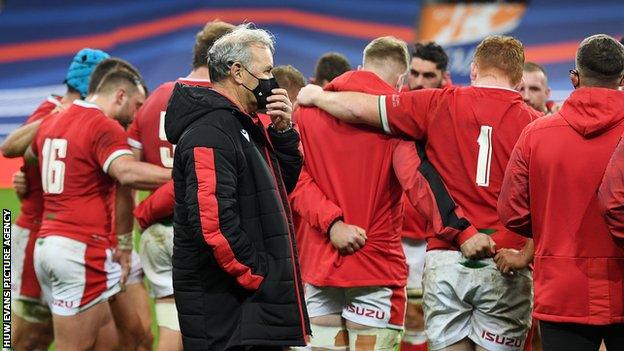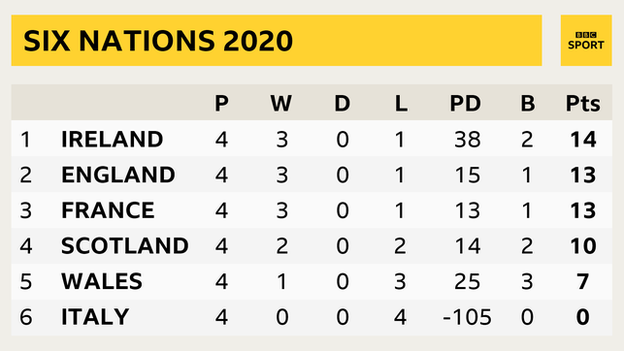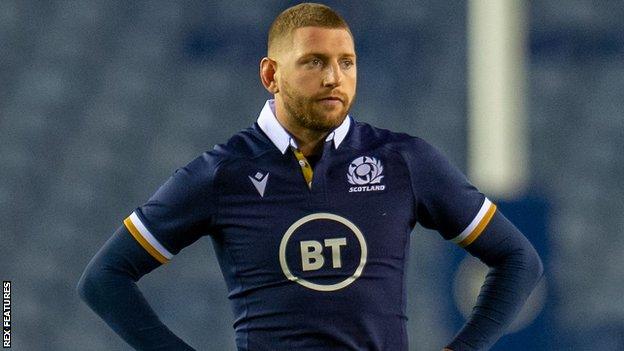Wayne Pivac: Wales coach aims to halt early losing streak
- Published

Wayne Pivac has previously coached Fiji at international level
Wales coach Wayne Pivac had seven months between matches to think about international rugby's return.
He has plenty to ponder now following a chastening 38-21 defeat to France in Paris.
The dream start to his tenure, a 42-0 home win over Italy in February, seems a long time ago after four straight defeats, against Ireland, England and France twice.
Pivac is an experienced campaigner and knew his honeymoon period would be short-lived if results went against him, especially when he was following in the footsteps of fellow New Zealander Warren Gatland.
Evolution not revolution has been the message since Pivac took over, but he knows he is in a results business.
Wales have lost four successive matches for the first time since 2016, albeit in strange circumstances.
Saturday's loss in Paris saw Wales concede more points against a European team than they have in any game since shipping 62 against England in 2007.
It was also their heaviest defeat to France for nine years, although a first game since March against outstanding opposition.
Wales finish their Six Nations campaign with a dead rubber against Scotland next Saturday knowing victory is essential to halt that losing streak.
France, England and Ireland can still win the title on the final day in the longest Six Nations tournament in history.
All Pivac's men can do is hope they can defeat Scotland and claim fourth place. No Wales side has won only one game in this single tournament since Gareth Jenkins was in charge in 2007.
And Wales only finished fifth once in the Gatland era, in 2017. Rob Howley was in charge that year with Gatland away with the British and Irish Lions.
Dodgy defence
Replacing defence coach Shaun Edwards after his departure to France was always going to be a tough task and any disappointment over his loss has been heightened by his new side completing a 2020 double over Wales.
Byron Hayward, Edwards' successor, had the perfect start to his tenure as Wales conceded no points against Italy.
Wayne Pivac on Wales' defeat in Paris
Since then, however, he has been welcomed to the brutal realities of international rugby, with 15 tries leaked in four games.
Wales were cut open by the brilliance of Antoine Dupont and Virimi Vakatawa in Paris this weekend as they struggled with the outrageous offloading of their hosts.
Some generous Welsh defending also played a part. Individual lapses contributed to three opposition tries, with Rhys Webb and Justin Tipuric rushing out of the defensive line and Josh Adams being sucked in.
Wales' aerial game was sorely and surprisingly lacking, with high-ball experts such as Leigh Halfpenny, Dan Biggar and Adams struggling, with one dropped ball leading to a Charles Ollivon score.
The attacking kicking tactics of retaining possession - Biggar is a world-class exponent of collecting his own efforts - were also rarely used.
Lack of momentum
One of the most startling differences between the two sides was the ball-carrying ability of the forwards.
The home back-row trio of Ollivon, Gregory Alldritt and Francois Cros punched over the gainline to provide momentum, backed up by the French front five.

Ireland can secure the title with a bonus-point win in Paris next weekend
In contrast, Wales do not have that ball-carrying presence up front.
It is not a new problem under Pivac and alternative gameplans have been forged in the past, with centre Jamie Roberts often used as the battering ram in Gatland's era.
The back-row physicality, often provided by Ross Moriarty or Josh Navidi, was missing with the duo suffering from an ankle injury and concussion respectively. Neither will be available to face Scotland.
Wales also missed Navidi's ability at the contact area, where he is known for slowing down opposition possession, creating turnovers and clearing out opposition.
When he took charge, Pivac promised to develop Wales' attacking approach under the guidance of former Wales fly-half Stephen Jones. We are yet to see the full fruits of their labour.
Wales had possession in Paris but following their dream start, with a Halfpenny try in the opening minute from a well-worked move, they offered little in attack.
Replacements Louis Rees-Zammit and Gareth Davies provided some late impetus but Wales' systems struggled to break down the aggressive French defence, with low speed in possession at the breakdown in marked contrast to the home side's quick ball.
The lack of forward front-foot momentum contribute to that, but the new-look Welsh midfield of Biggar, Nick Tompkins and Jonathan Davies never clicked on their first outing as a unit, while wings George North and Adams were not involved enough.
Tompkins had switched to inside centre and will need time to develop there in international rugby.
Scotland visit

Finn Russell made his first Scotland appearance of 2020 in Friday's 48-7 win over Georgia
Wales have little time to right the notable wrongs of the France performance, as Scotland arrive in Llanelli next Saturday full of confidence and boasting Finn Russell and Stuart Hogg in their ranks.
The Scots, who warmed up with an emphatic 48-7 victory over Georgia, will aim for a first away win against Wales since 2002.
Welsh changes will be considered, with some probably forced upon Pivac. Dan Biggar and Nick Tompkins will be monitored while prop Samson Lee came off in the first half against France with a head injury, with Exeter tighthead Tomas Francis ready to be parachuted in after winning the English and European double with his club.
Wasps lock Will Rowlands could also provide the bulk needed in the front five.
Pivac criticised the aerial failures against France and has Liam Williams waiting in the wings after his Scarlets return against Benetton.
He might though want Williams to have more than one regional outing before playing for Wales, given that the 10-3 Pro14 win over Benetton was his first game in almost eight months.
Pivac also has the temptation of handing 19-year-old Rees-Zammit his first Wales start.
At the other end of the scale, 35-year-old Alun Wyn Jones should finally break Richie McCaw's world-record caps tally against Scotland.
Jones was in the thick of the action in France, where the lock felt the full force of a Bernard Le Roux forearm tackle that the second row has been cited for.
The Wales captain will want minimal fuss, but a Wales win would be fitting to mark his landmark appearance.
Jones, no doubt, will demand the key message this week is success over sentiment.